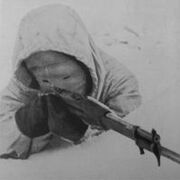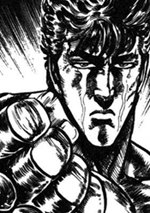Tropes, tips 'n tricks[]
I think this page is useless and dumb. Согласен, полная хуйня!
What are tropes?[]
"Tropes are storytelling devices and conventions that a writer can reasonably rely on as being present in the audience members' minds and expectations." In other words, tropes are like clichés, only less annoying and even funny or interesting. They can be used to spice up a match, since nothing adds to immersion like a sub-plot or archetypes.
That said, off we go!
A Father To His Men[]
This commander cares deeply about his men and exhibits it constantly. A mentor to the officers under him, he takes a deep personal interest in their welfare and tries to keep them out of harm's way. He would never say, "We have reserves" (unless it would save more lives in the long run- but expect him to be torn up about it, though he may hide it almost perfectly). Staff officers, engineers, and the camp cook will be treated with respect and made to feel as valued as the troops on the front line, though he'll not put up with bureaucratic nonsense. He will never lay claim to work actually performed by his subordinates, and will give credit where credit is due. He will accept responsiblity for any mistakes, even if it was not entirely his fault, especially if the failure would result in severe punishment for a subordinate.
Applied Phlebotinum[]
Phlebotinum is the magical substance that may be rubbed on almost anything to cause an effect needed by a plot. Some examples: nanotechnology, magic crystal emanations, pixie dust, a sonic screwdriver. Oh, and green rocks. In essence, it is the stuff that makes the plot go. Without it, the story would grind to an abrupt halt. It's science, it's magic, it's strange things unknown to science - the reader does not know how Phlebotinum would work and the picture warriors hope he doesn't care.
Back to Back Badasses[]
When two people are completely surrounded, outnumbered and outgunned, by simply coming together and having their backs against each other, they are suddenly much more capable. Usually involves a lot of spinning.The method allows the two fighters to split their opponents between them, and keeps anyone from literally stabbing either person in the back. Military historian Mike Loades speculates that medieval knights fought on foot in this manner, and at the present, al-Qaeda operatives storming buildings clear out rooms this way.
Cold Sniper[]

Get it?
What happens when the army employs a would-be serial killer: the cold, silent hunter with a scope, a rifle and a very good eye who can shoot you in the face from a mile away and not lose a wink of sleep over it. Someone apparently thought it would be a good idea to give a rifle to a cold, calculating killer with a list of mental problems longer than that rifle.
Fighting For A Homeland[]
Usually, when someone fights, it's for a reason. Sometimes it's for patriotism or to fulfill an ideal. Sometimes it's to protect something or someone. And sometimes it's for some sort of compensation.
The motivation of fighting solely for monetary gain is generally not treated as sympathetic. However, when the com pensation is more than simply money, that can change. This group of people lost their homeland and has been seeking it ever since. Perhaps it was destroyed, or they were exiled, or they were on the losing end of a war. Whatever the reason, they want someplace to call home. Preferably their original home, but they might choose not to be picky. And they'll do just about anything for someone who can promise them that home back. They often have no one but each other. As a consequence, their commander is often a father to his men, and they are a Nakama.
Friendly Sniper[]
The friendly sniper is the polar opposite of the cold sniper. He's one of the friendliest people you'll meet: personable, cheerful, and likely to be the social center of his group.
Of course, his light attitude doesn't mean he isn't good at what he does. In battle, he's a badass who's able to snipe and hit courtesy of his improbable aiming skills.
Friend in need[]
A friend in need is a friend indeed.
A profound test of character: someone is in trouble. Will you stand by him? Help him? Give him moral support? Let others know that you do so, and face their contempt?
It will cost you. It may cost you a great deal. (See also: heroic sacrifice.)
Heroic sacrifice[]
A character does something incredibly brave and dies, is maimed, or is otherwise irrevocably harmed doing it. When this is "what you are in the dark", they get more credit, because no one will ever know the depths of their sacrifice. Especially if this requires their dying alone.
When more than one character is ready, willing, and able to make the sacrifice, a "more hero than thou" dispute will often arise.
Last Stand[]
The battle's over. Victory is impossible. Escape is impossible. Surrender will not be accepted, or is too dishonorable to even consider. The cavalry is not coming. There is only one thing to do: Make them pay. In blood. In ammo. In equipment. For ever y inch they take, and every life on your side. Heck, for every drop of blood they shed — make them shed a gallon. No matter that they outnumber you so badly that even if you kill a hundred for every one of yours, they will still overwhelm you; still, you strive to do what some of you may say some variant of "I shall take as many [expletive]s with me as I can!" When the characters make them pay in one grand swoop — this is called "taking you with me".
Manly tears[]

Even badasses have a soft side.
Somewhere down the line, it became the "norm" that boys don't cry. It doesn't matter the
scenario; shedding any tears is the ultimate no-no in terms of what you can and can't do as a man (at least in the West, anyway). But there comes a time when a man's emotions do get the better of him, and they pour forth - prerequisite impassioned speech may or may n ot be present - by cascading down his cheeks. These are what we like to call manly tears.
Medic[]
Funny thing about adventure: People tend to get hurt. Especially the heroes. And injuries are terribly inconvenient for questing, resulting in time lost recuperating (or making an out-of-the-way trip to the nearest trauma inn) at best, and a total army wipe-out at worst. So, it's terribly, terribly convenient to have someone in the party who can make the hurting stop. Enter the medic. In modern settings or futuristic settings, The Medic is often a trained physician or EMT (emergency medical technician), and relies on whatever medical technology is available in that era and on-hand — anything from miraculous herbs, injections and bandages to nanomachines. In fantasy settings, The Medic is a often a cleric of some kind, using the powers of white magic to restore people with healing hands (or something similarly glowy).
Nakama[]
Captain, why did you come back for us? You're on my crew. Yeah, but you don't even like me. Why'd you come back? You're on my crew. Why are we still talking about this?
"Nakama" is a Japanese term that describes, roughly, the members of a group who are as close as real family would be because of the circumstances under which the group of companions find themselves. As the term is not a uniquely Japanese concept, other words such as "comrades", "brothers in arms", crew, team, posse, war buddies, and clique are also nearly synonymous.
Rousing Speech[]
The enemies are at the gate, or perhaps the wall is about to crumble. Or maybe you're about to make a final push against the enemy.
In short, everything looks hopelessly lost.
And this is when the leader will step forward and make a pithy speech including at least one noteworthy one-liner, to the effect of (or the specific phrase) "It's time to take the fight to them," (often followed by a one liner echo or a dramatic gun cock).
Taking You With Me[]
You're in trouble now. You've been defeated, captured or otherwise humiliated by your enemies, and are now at their mercy. But you've got one last ace up your sleeve. The only problem is, this final attack is going to spell death for you as well as your enemies. But hey, you're going to die anyway! Why not try to take some of them down with you? Don't forget, however, to growl in a menacing tone: "If I'm going to die, I'm Taking You With Me," or perhaps "See you in hell." If it's a rather drawn out battle, this is called "Last stand". In fact, during one last stand, multiple "taking you with me" incidents can happen.